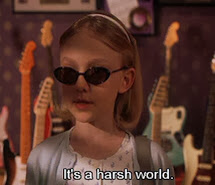Uptown Girls
by jamontsky
The early 2000s were weird. I'm just going to say that now. Remember Suddenly 30? What in hell was that? This is one of the few so-called eras I've been alive for and I understand it less than any other. Why is everything glittery? Why are grown women wearing butterfly designs? I conclude that society wasn't ready for a new millennium. Which is why we dashed to glitter and butterflies and Brittany Murphy as fast as our feet would take us.
The concept of Uptown Girls is okay, sure. Wealthy, orphaned and 22, our heroine loses all her money for some reason and has to get a job. Then she buys some sheets for her deadbeat boyfriend. I don't know, honestly, because this film gives me a headache. Anyway, she winds up nannying the sharply intelligent (read: pain in the arse) daughter of a music executive and a vegetable and teaching her a few lessons about the perils of classical music, dashing around New York in heels and giggling inanely.
What's most confusing about this film are the dead ends. Hollywood has a way it likes to lead us and I don't like it when it varies from that for no reason. So, when the best friend winds up being shallow, the best guy friend is comforting and ace and not gay, and the love interest turns out to be shallow and rubbish, why don't they part ways/fall in love/part ways also? Uptown Girls offers no explanation for setting these cliches up and then taking them nowhere. If the entire film presented an equal challenge then I'd understand. But the rest — the “gaining of mutual respect” trope I love and hate in near equal measures — is textbook. I just don't get it, and I don't like to be confused. Although the fact that the director wrote Dirty Dancing: Havana Nights explains so much.
That's 2003's Uptown Girls, directed by Boaz Yakin and starring Brittany Murphy, Dakota Fanning, Heather Locklear and Jesse Spencer.




